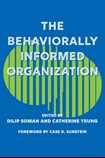- Behaviour
Applying Behavioural Science
An authoritative guide to becoming a behaviourally informed organization

The Behaviorally Informed Organization, a new book edited by Dilip Soman and Catherine Yeung, explains the strategic basis on which governments, businesses and other organizations have used techniques derived from behavioural science, and provides an accessible practical approach any business can employ to enhance its own future strategy through the use of behavioural insights.
Truly understanding what makes their customers tick, employees engaged, or, in the case of governments, society behave, must be the holy grail for any leadership team. Until recently such understanding was based on hunches and speculation. Now, the study of judgment and decision making and our greater understanding of how the brain works has brought a clearer appreciation of how people interact and how they respond to situations. With this knowledge has come the ability for organizations to take specific actions to ‘nudge’ people towards different responses and different decisions.
Nudging―using subtle messages to effect behaviour change―is perhaps the main way that insights from behavioural science are applied. The book lists ten different types of nudges. For one, it gives the example of encouraging eco-friendliness with the message “Nine out of ten hotel guests reuse their towels.” (Presumably, the alternatives might have been either an annoying rule to say towels will not be replaced, or an expensive incentivizing free reward.) Gentle persuasion, when it works, is clearly be the better way―it is relatively cost-free for the nudger and crucially preserves the nudged individual’s freedom of choice.
Whatever their purpose, size, or structure, most organizations are in the business of behaviour change―whether achieved by rules, or through offering incentives, or better still through persuasion. Behavioural science offers a level of understanding of human motivation that can greatly improve an organization’s ability to persuade.
Using many illustrative case studies, this book develops an overarching framework for using behavioural insights to solve a wide range of business problems. It also considers the organizational barriers that can hinder the application of behavioural insights and the organizational culture changes needed to fully embrace them.
The contributors to the book contend that “the potential of behavioural insights to fundamentally change the way in which organizations operate and interact with their stakeholders is nowhere near to being fully harnessed.” This is partly due to the findings of lab-based research into behaviour not being readily applicable in corporate practice, and partly due to a misunderstanding by practitioners of how the process of behaviour-change interventions works. The book sets out to “help both practitioners and academics converge in the common quest of developing behaviourally informed organizations,” and to close the gap between “the promise of behavioural science” and its effective adoption by organizations.
The framework suggested involves both understanding of the motivations, emotions, perceptions, and cognitions that underlie human behaviour, as well as understanding organizational realities and what capabilities organizations need to be behaviourally informed in dealing with their stakeholders, including the important ability to use scientific method to experiment and test behaviourally informed solutions.
In a fast-changing world, beset with multiple complex problems, the need for organizations to apply new evidence-based tools to find workable solutions has never been greater. The time is absolutely ripe for behavioural science to fulfil its potential, and in this important book the contributors offer “a roadmap of how to make things [behavioural insights] work.”
The Editors
Dilip Soman – Professor Soman serves as Director of the Behavioural Economics in Action Research Centre at Rotman School of Management, University of Toronto
Catherine Yeung – is Associate Professor of Marketing at The Chinese University of Hong Kong (CUHK) Business School
……………………………………………………………………………………………………………………..
‘The Behaviorally Informed Organization’, edited by Dilip Soman and Catherine Yeung. Published by the University of Toronto Press, 2021, ISBN 978-1-4875-0789-3
Rotman School of Management is Canada’s leading business school and has Canada’s largest group of management faculty. It is home to some of the most innovative research institutes in the world
ARTICLES YOU MIGHT LIKE
RESEARCH
LBS and ESMT study identifies the danger of citing information based on the ‘gist’ of the truth rather than the ‘literal’ truth
DEVELOPING LEADERS QUARTERLY MAGAZINE AND WEEKLY BRIEFING EMAILS


































